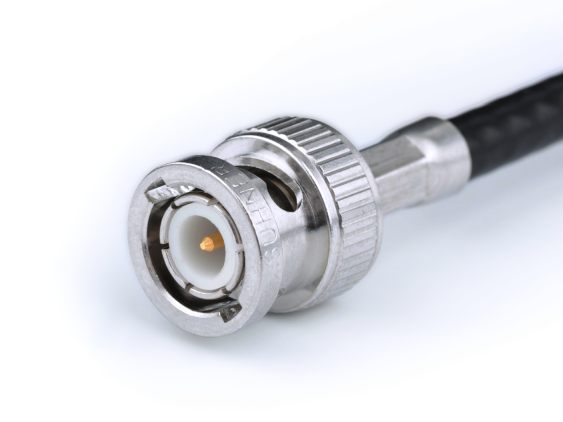High Frequency
RF Connector Types
The table below contains a list of high frequency connectors used within QuTech. Some of these are not used within the SPI Rack environment, but are listed here for documentation as they are commonly used. A couple of these connectors are also used for DC purposes for both the IVVI and SPI Rack, the use case should be clear from the circumstances.
| Name | Picture | Description |
|---|---|---|
| BNC |  |
The BNC connector is a quick connect RF bayonet connector. It is designed to work up to 4 GHz. Above it will still function, but the slots may radiate signal. Both 50 Ohm and 75 Ohm versions are available. |
| MCX |  |
These are snap-on micro-coax connectors usable up to 6 GHz. They are available in both 50 Ohm and 75 Ohm. Within the SPI Rack and IVVI Rack framework they are mainly used for DC signals connected directly to sample-related equipment. |
| N |  |
Cheap and rugged connector, found on lots of measurement equipment. Usable to 11 or 18 GHz depending on manufacturing. |
| SMA |  |
The workhorse of the RF industry. It has a 4.2mm diameter outer coax which mates with the 3.5mm and 2.92mm connectors, but combining these might damage the higher end connectors. They can be distinguished by having PTFE dielectric instead of the air dielectric of the 3.5mm and 2.92mm. Depending on the tolerances in manufacturing, they are rated for 18 GHz or 26 GHz. |
| 3.5mm |  |
A precision connector usable up to 26.5GHz. Mates with SMA and 2.92mm connectors. |
| 2.92mm (K) |  |
A precision connector usable up to 40 GHz. Mates with SMA and 3.5mm connectors. |
| SMP |  |
Small microminiature push-on connector usable up to 40 GHz, mainly used on sample carrier PCBs. |
| 2.4mm |  |
High end, precision connector usable up to 50 GHz. Compatible with the 1.85mm connector. |
RF Connector Frequency Limit
The figure below gives an overview of the frequency limits of the connectors listed above. Above this frequency, unwanted modes start propagating. So don’t use connectors and cables above their specified cutoff frequencies.
For N and SMA connectors, there are higher precision (and more expensive) versions available which have a higher frequency limit. These SMA connectors are not to be confused with the 3.5mm connectors.
RF Connector Compatibility
The table below shows which connectors can mate with each other. But as a note: just because connectors can be connected, doesn’t mean they will work properly with respect to power handling and frequency. The maximum frequency is always set by the lowest frequency connector in the chain.
SMA connectors will mate with 3.5mm and 2.92mm connectors. However, a cheap SMA connector will damage the high precision expensive connectors.
| BNC | MCX | N | SMA | 3.5mm | K | SMP | 2.4mm | |
|---|---|---|---|---|---|---|---|---|
| BNC | ✔ | |||||||
| MCX | ✔ | |||||||
| N | ✔ | |||||||
| SMA | ✔ | ✔ | ✔ | |||||
| 3.5mm | ✔ | ✔ | ✔ | |||||
| K | ✔ | ✔ | ✔ | |||||
| SMP | ✔ | |||||||
| 2.4mm | ✔ |
The images below show how you can recognize the different connectors. SMA is the easiest, as it is the only one with a PTFE dielectric, all the other high frequency connectors have air dielectric. The name of the connectors is determined by the diameter of the dielectric. By eye it can be quite hard to differentiate between the 3.5mm and the 2.92mm, especially since they are physically compatible.
 SMA |
 3.5 mm |
 2.92 mm |
 2.4 mm |
These images were taken from Keysight’s What mates with what page.